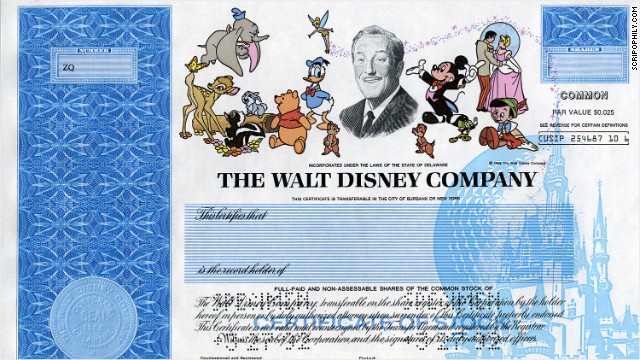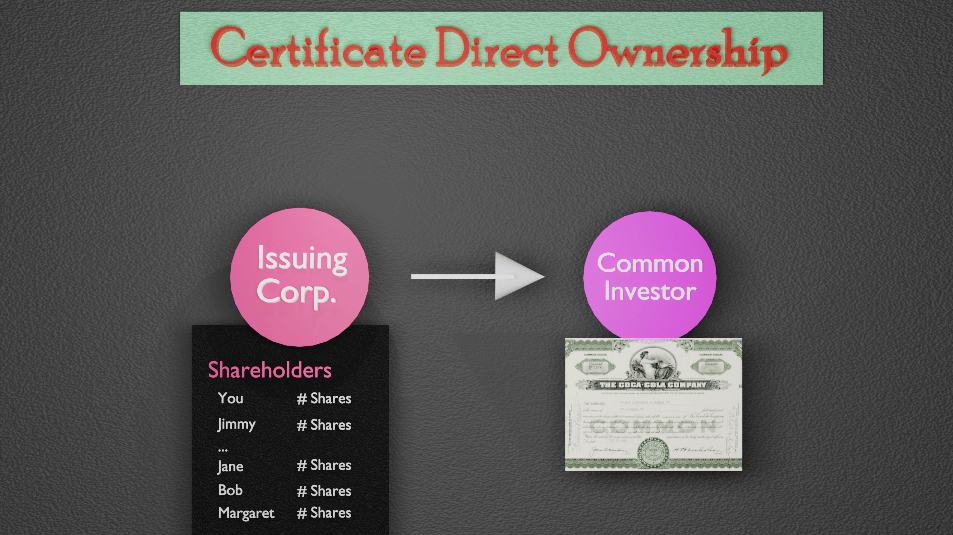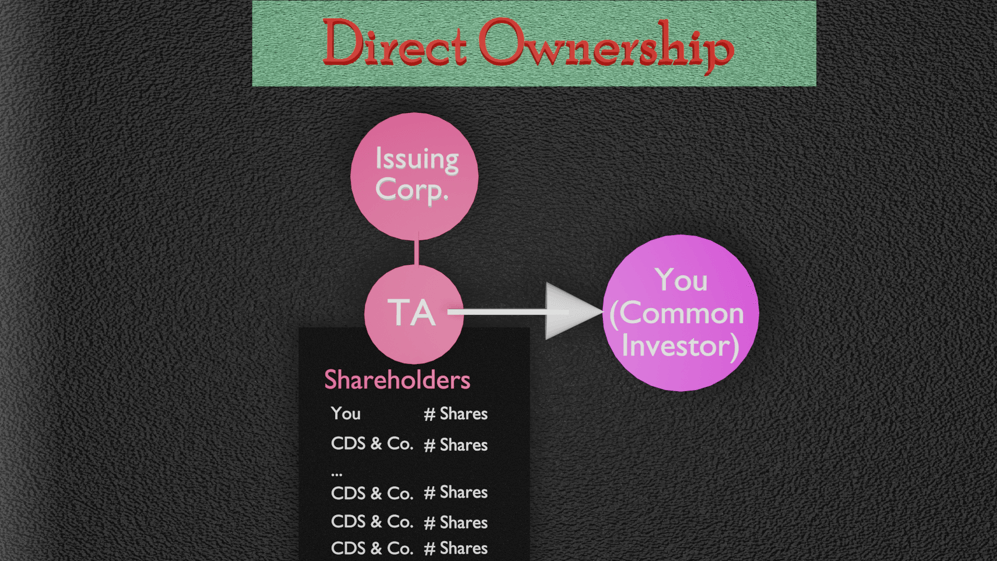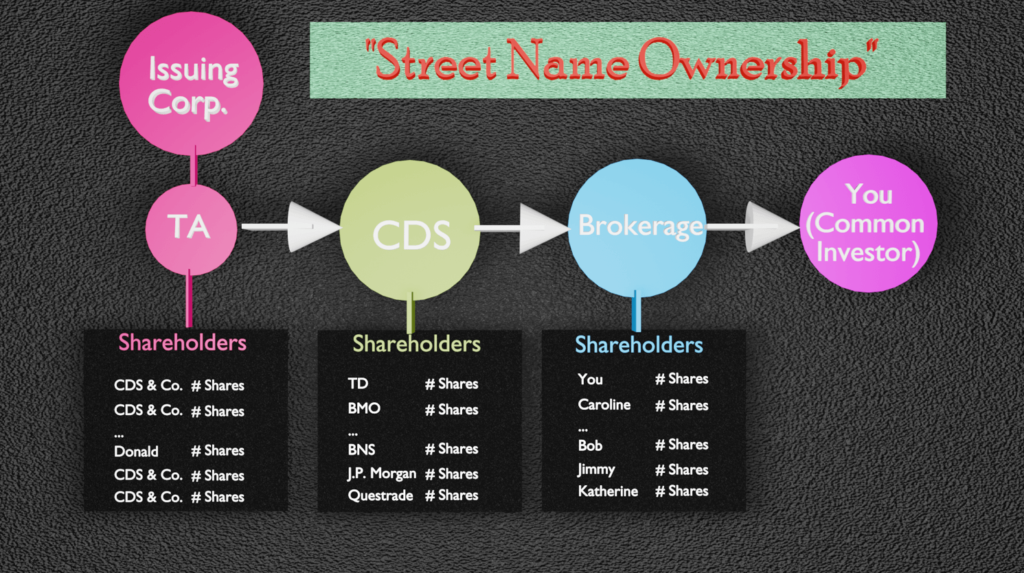Ownership seems simple on the surface. You own this, I own that, someone else owns something else . All kind of straightforward. However, the modern financial system is a labyrinth of competing interests, obligations, and claims. It’s hard to sort out exactly who owns what and why.
In this article I will explore how stocks are owned in modern day North America. You will find that things are a little more complicated than you thought.
Back in the Day
Back in the old days, when you bought a share in a corporation, you received a stock certificate. These certificates certified you as the owner of x number of shares.

Back in the day, buying a stock meant buying these certificates. Not only that, but when you were the owner of a stock of a company, the “shareholder register” of that company recorded you as the shareholder. This made you the “Registered Shareholder”.

This was known as Direct Ownership or Direct Registration.
Nowadays
Nowadays, direct ownership of stocks still exists. Companies now generally employ a “transfer agent” (TA). This “transfer agent” maintains the “shareholder register” for the company.
Therefore, this is what modern direct ownership looks like:

Nowadays, paper certificates are much less common. Instead, a system known as the “Direct Registration System” is used to facilitate direct ownership. This is simply an electronic version of stock certificates. You don’t get a fancy cool paper certificate, but for most intents and purposes it is the same thing.
However, it may shock you to know that you very likely do not directly own the stocks you buy through your broker! That’s right, the majority of stock trading is now done through an “Indirect Holding System”.
Indirect Holding System (AKA “Street Name Ownership”)
Unless you have gone through extra effort to directly own your stocks, they are not registered to you. They are likely held indirectly through a system known as “Street Name Ownership” (or “Street Registration”).
In fact, if you own Canadian stocks they are likely registered to a company called “The Canadian Depository for Securities” (CDS) which is owned by the TMX group. Most likely, your stocks are registered under the name “CDS & Co.” This makes CDS & Co. the Registered Shareholder of your shares.
This diagram shows the relationships in this system:

As you can see, the Registered Owner of your stock is “CDS & Co.” (on the companies’ shareholder registry on the left). The CDS holds approximately $4 Trillion of securities in trust for various brokerages. It is extremely likely, for instance, that your broker has an account with the CDS.
As you can see, there are now two more registries. The CDS maintains a registry of brokerages which have stocks held in trust with them. Meanwhile, the brokerages have their own registry linking stocks with customers. Thus, the stock can be traced to you.
This system ultimately establishes you as the “Beneficial Owner“. This means you are entitled to dividends and proceeds of sale, among other rights such as voting.
Beneficial owners are the natural persons who, through direct or indirect means, have ultimate ownership or exercise control over a corporation.
– https://www.ic.gc.ca/eic/site/142.nsf/eng/00001.html#3
However, in order for these rights to be granted, for instance in order to vote, many things must happen. Ever wonder why the voting slip you get in the mail is a “Proxy” voting slip? That is because you have been granted the right to vote on behalf of “CDS & Co.” CDS & Co. must grant the right to vote to the brokerages, who then pass that right on to you. A little complicated I would say… and maybe a little patronizing.
Reasons for Indirect System
There are reasons that the system operates this way. Those reasons are efficiency and control. Having one place where all transactions can be tabulated and cleared is much simpler to keep under control. The Indirect Holding System was established in the 1970’s as a way to “immobilize” stocks in one central location. Moving paper around had become too inefficient for the brokerages. Stock certificates were being lost, damaged, stolen, etc. Central depositories such as the CDS solved these issues.
By the way, if you decide to move to direct ownership, just know it will reduce liquidity (ease of trading). That is because the modern stock trading infrastructure is based on indirect ownership.
Your Thoughts?
So what do you think about this system? I know when I first learned about it I was quite shocked and indignant. How can I not be the registered shareholder of my stocks!?!
Some people have obviously had similar feelings. In fact, there is a movement among GameStop (GME) holders to move their securities over to Direct Registration. In order to read about this, I recommend you head over to the Reddit Deep Dive into GME thread (https://www.reddit.com/r/DDintoGME/).
In the end however, we must appreciate that the system works (at least so far!). Insofar as beneficial interests continue to accrue to the common shareholder (you), does it really matter how they get there? I guess that is the question.



